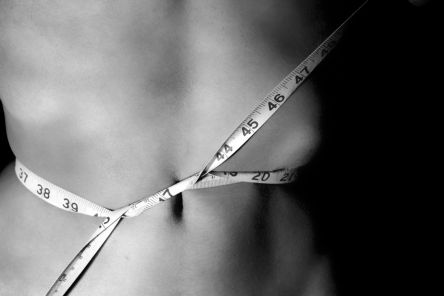By her second semester sophomore year in college, Liana had quickly learned that by eating certain foods and guzzling a bottle of water after leaving her college cafeteria, that she could easily purge after every meal she ate.
By the start of her junior year, Liana had plummeted so far deep into her tunnel of depression and bulimia, that she was planning to commit suicide on Sept. 12th, 2016.

According to the Multi-Service Eating Disorders Association (MEDA), 20 percent of college students in 2016 reported that they currently suffer or have previously suffered from an eating disorder. Although eating disorders or a more humanized name for the disorder, ‘Ed,’ continue to run rampant through the lives of college students, Ed’s common and unceasing presence slides under the radar of importance and topic of conversation on and off college campuses.
When Liana met Ed
Since adolescence, Liana has been in a re-ocurring battle with a chemical imbalance in her brain causing depression, leading her to self-harm throughout middle school and high school.
“The self-harm was an outlet, so it was a way to control things,” Liana said. “When I went into college I realized that you’re surrounded by people at all times and people start to notice things a lot more. As I experienced different friendships and relationships, I saw that it was harder to hide these things, so I needed something that I could control that was something more silent and easier to hide.”
The way in which an eating disorder develops is very often misconstrued; an eating disorder is not as simple as someone disliking eating or liking eating too much.
In Liana’s case, her battle with depression, anxiety and negative body image became a breeding ground and an invitation for Ed to quickly become an overpowering and dominating voice within the inner-dialogues of her mind.
In the spring of 2016 and in the midst of Liana’s sophomore year, she quickly learned how to binge and purge caused by her anxiety, critical self image and depression.
“I learned the foods that were easier to binge on that came up faster,” Liana said. “It quickly progressed from one day I found that I could throw up, to me the next day throwing up three to four times. I would constantly compare myself to everyone else’s bodies and that was horrible. I was just constantly insulting myself.”
Often as a result of mental illness which goes hand in hand with Ed, a person’s memory can be seriously impaired, making retention practically nonexistent. Because of this, being successful in academics is an incredible feat for those suffering from mental illness. As a child, Liana’s depression was so interwoven into her life, that she doesn’t remember most of her childhood.
During the time that her depression and Ed were at their strongest, they would prevent her from learning information that she would normally pick up quickly, like studying for a test or writing an essay.
“I had absolutely no motivation,” she said. “I always so exhausted. I would sleep for 10 hours and still be exhausted for the entire day, prompting me to get absolutely no school work done because I couldn’t function after purging at least three or four times that day.”
Liana, typically a very dedicated student, had the most challenging academic semester yet.
“I wasn’t doing well in school at all, and my GPA plummeted,” she said. “I would sit in bed and cry, because the anxiety from my grades would make my depression worse, which led me deeper into my eating disorder.”
Instead of attending classes, Liana’s days were filled with her fixation on when she will be going to the dining hall, what she would be eating and restricting her caloric intake to about 300 calories per meal.
Alcohol became an important part of her relationship with Ed, her social life and her body image as well; barely eating anything for dinner before she would go out in fears of looking fat, Liana would drink on almost an empty stomach, only to vomit the alcohol that she had consumed that night to avoid the caloric intake.
Despite the weaker voice inside of her reminding her that she had to eat, Ed’s influence was overwhelming at all times. Alcohol not only fueled Ed physically but after consumption Liana would suffer for days of deeper depression as the alcohol would detox from her body.
According to the Seattle Times, although not yet deemed a medical term, those who often suffer from ‘drunkorexia’ are college-age binge drinkers, typically women, who seriously control their food intake to offset the calories in the alcohol they consume. Drunkorexia is primarily associated with serious eating disorders, particularly bulimia, which usually involve behavior like bingeing on food and then purging.
After a summer almost entirely devoted to Ed strengthening his clutches around Liana’s mind, body and soul, she began to enter into what she calls one of the darkest times she will ever experience in her life.
In the beginning of her junior year, Liana’s friendships began to suffer along with almost every other aspect of her life.
“Ed ruined my relationship with so many friends,” Liana said. “I was never around and avoided them along with all of my problems. I lost many friendships by my coping strategy of avoiding.”
Social anxiety and heightened emotional situations also triggered her to purge. “Whenever there was negative energy, drama or I would be fighting with a friend, it would cause me to purge,” she said. “I would literally excuse myself in the midst of all of this and go vomit.”
Anxiety is Ed’s favorite way to gain momentum and power over Liana’s headspace; living in an environment such as on a college campus, Liana is inevitably surrounded by noise, parties, alcohol and so many more triggers that threw her deeper into the mental anguish that Ed and her depression had waiting for her. Trying to take grasp and have a sense of control in a stressful and anxiety-ridden environment such as college, Liana was drawn to the short-term jurisdiction she had in regards to Ed. Just as she could control filling her stomach, she could control emptying it as well.
“When everything was being thrown at me at once and I felt like I couldn’t control any of it, food was the thing I could control,” she said. “At first it was exciting that I could find something that could give me the release I was looking for, and could eat whatever and perform this magic trick where I could just throw it back up, but then it became a habit– it sucked the life out of me. I became a ghost.”

The dark before the dawn
It was a Monday.
On Sept. 12th, 2016, Liana was planning to take her own life.
That morning, Ed had done his final damage.
While the mirror was looking back at Liana, all she saw was Ed’s reflection and someone who was not enough and who could never be worth enough.
That morning she felt no emotion and was confident in her decision.
Sitting down later in the day in the cafeteria with a friend, Ed made a mistake and loosened his grip for the first time. Liana’s friend asked her how she was doing.
Looking up at her friend, Liana whispered, “I don’t want to be alive anymore.”
Liana cannot quite recall the rest of the afternoon, only aware that she had laid in her friends dorm, sobbing that she just wanted the pain to end and she did not want to be here anymore.
Liana would spend the next five days in the psychiatric ward of a hospital for having suicidal intentions.
During that time, she was under constant surveillance by nurses and doctors, where the focus of her stay was to keep her from doing any harm to herself and not so much helping get rid of Ed. Liana was stripped of almost everything, even prohibited from wearing pants with strings in fears that they could used for self-harm.
During her stay she would wake up at seven o’clock in the morning and painfully pick out her meals for the day, while group sessions filled her time. Liana would encounter drug addicts, fellow college students, ex convicts and even mothers who had children.
“Wanting to take your life almost seems selfish,” Liana said. “But it’s really when you’re left with no other options. You’re left thinking that you aren’t worth anything, and it’s hard for you and everyone around you to process that.”
Growing up, Liana had toyed with suicidal thoughts before, asking what it would be like if she was not alive. During the summer before her junior year, her thoughts escalated where she would ask herself how she would do it, when and where.
Liana learned a very powerful lesson more so from the fellow patients rather than the therapists.
“I took away from that experience more than anything that I have to get help now for my issues rather than later, and I’ve been dealing with depression for about 10 years now, and that was manageable.” she said. “What needed to be addressed immediately was Ed, because that was pushing me over the edge, but it wasn’t a treatment center.”
Yet the hospital was more of a holding place for Liana where she had to demonstrate that she would no longer be a risk to herself, rather than a place where she could receive the therapy and support that she needed.
After five days, Liana returned immediately back onto her college campus.
“I felt like I had this gaping wound that I was trying to hide from everyone,” she said. “No one really knew at school, so I was continuing my habits until I entered treatment a few months later.”
Within those months, Liana would continue to live each day as a hollow shell spiraling deeper and deeper, listening only to Ed as he kept distancing her from everyone she cared about, everything that made up what she enjoyed and everything that made her once happy.
Soon, Liana’s strength built up once more as it had on that Monday in September, as she spoke up for a second time about her battle with Ed.
Despite the manipulative lies that Ed was telling her, preaching that she was unworthy of treatment because she did not actually have an eating disorder while he pointed out every socially anxious and unrealistic thing situation that could break her, Liana entered an eight-week long program at The Renfrew Center in December.
The dawn of recovery
“I was very withdrawn for the first couple weeks, but as time went by and I saw the support from the other women and therapists I started to speak up,” Liana said. “I found refuge in my group therapy sessions and the bonds I made with those who were suffering by the hands of Ed, just like I was.”
To Liana’s shock, many of the fellow women who were in her program had dealt with the same struggles Liana had. Approximately 90% of those suffering from an eating disorder also suffer from a mental illness such as depression.
When Liana opened up about her planned suicide, she found out that she was not the only one who had grappled with suicide, which made her open up even more.
At Renfrew, Liana would begin to learn how to distinguish between Ed’s voice telling her that if she was fat, she didn’t deserve to live, and her own voice telling her that she was worthy of recovery.
Liana was beginning to feel her own inner voice become louder again and able to talk back to Ed. She was growing happier and started to see hope where her future lay.
42 days into being free of Ed, Liana relapsed as Ed spoke to her again.
After binging and purging from a carton of ice-cream, Ed left Liana and her loved ones hurt and feeling defeated. Rather than reaching for support as Ed was calling her towards the bathroom, she remained silent, reaching out only after Ed had shown his truth.
Although Liana had relapsed and does not deny that it may happen again in the future, she vows that she will continue to learn where her inner strength lays and strives to keep up with her impeccably hard work to beat Ed.
“I fell on my face and realized that I never wanted to be there again,” Liana said. “I thought that at least I didn’t keep quiet. That was a step in the right direction. Eating disorder recovery isn’t a linear path and I needed that relapse in order to grow. I use my friends and family’s love for me as support.”
Relapse does not cease or discredit the progress that is achieved in recovery.
Liana is now in her second semester of her junior year, enrolled in four classes and primarily focusing on her mental health and her needs. As a natural caregiver, the shift from Liana caring for others to her and others having to care for herself was difficult.
Her loved ones struggle with the fear of leaving Liana alone now and are fearful of hurting her and her fragile mental state, which was and continues to be a weird concept for her. Regardless, Liana is working towards a simplified life and focusing on a better future.
“I do this crazy thing now where I eat when I’m hungry,” she said. “And think about what I’d like to do with the rest of my life.”
Liana, who has kept a calendar marking her progress since she has left Renfrew, is now nearing almost 100 days of being symptom-free.
Liana would soon learn that the act of repeatedly throwing up at the capacity that she was would do serious damage to her digestive tract, making it very difficult for her to keep her food down in the future.
Because of her bulimia, Liana is unable to bend over after she has eaten, or stand up too quickly in fears of the harm it could do to her stomach. She now has to take medication daily in order to keep her food in her stomach.
“I’m trying to not want to make myself throw up from a mental standpoint,” she said. “But I threw up so much over the summer that from a physiological standpoint, my stomach has trouble keeping my food down.”
This is something that Liana still works on to this day. “It’s hard because how do I work out the dynamic of knowing that I must keep my food down despite my body and emotions not wanting to? But if I’m not forcing my food up myself, I still like to think that I’m on the straight and narrow with my recovery.”
“Now I try to think logically about food, and I don’t let Ed’s voice get to me,” Liana said. “I tell myself that my body needs these nutrients, I need to keep them in there. Even though the body dysmorphia that goes along with suffering from an eating disorder is still present sometimes, I know the facts. I know that the piece of meat I ate 15 minutes ago can’t physically make me bigger.”
Now choosing to abstain from alcohol entirely to avoid the depressive side effects, Liana is among the minority of 21-year-olds who refrain from consumption.
“The after-effects just aren’t worth it,” she said. “I’d rather not drink at all and feel okay for the next four days and not worry about the mix with my antidepressants than have a night of hazy enjoyment.”

Looking towards a brighter future
Liana has found solace in different activities and has made big and little changes to offset her eating disorder. She has moved into a different residence hall on her campus with different style bathrooms, calms her triggers by painting on wooden logs as her canvases and even takes the time to write about her own experiences with bulimia.
Social media has been a tactic to keep Liana focused throughout her recovery as well.
“I deleted every fitness guru and any other instagram account that made me feel insecure off of my timeline,” Liana said. “And I replaced them with eating disorder awareness pages. Throughout the day as I scroll I’ll see a quote about how I should keep holding on, and that is something that never hurts.”
Every single day that Liana continues to swipe Ed’s buzzing voice away from her ear and out of her head counts as a victory.

Every meal that Liana manages to keep inside of her stomach is a cluster of nutrients that keep her body healthy are well-earned and very much deserved.
Every time Liana makes the conscious choice to listen to the part of her that loves her and think of the beautifully bright future she has ahead of her, she is one step closer to winning her war against her bulimia.
“There’s going to be setbacks, there’s going to be days where you feel like you’re back to square one with no explanation as to why,” Liana said. “But dammit, you are worth a happy life, you are worth recovery, you are worthy of being so incredibly loved, and your voice is more powerful than you know. Don’t let Ed win. The most beautiful thing is that we are the authors of our own story.”
If you or anyone you know is contemplating suicide, please call the National Suicide Hotline at 1-800-273-TALK (8255), or text ‘CONNECT’ to 741741 to access the Crisis Text Line.
If you or anyone you know is suffering from an eating disorder and need support, please call the National Eating Disorder Association’s Hotline at (800) 931-2237, or text ‘NEDA’ to 741741 to access the Crisis Text Line, or visit Renfrew’s website here, where there are locations all over the United States.


